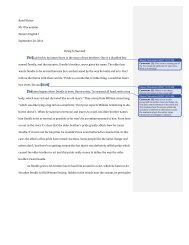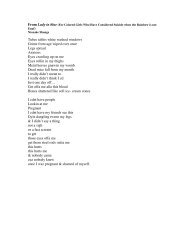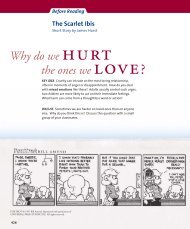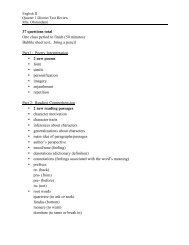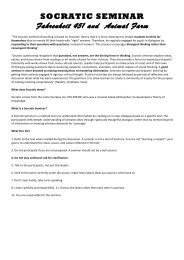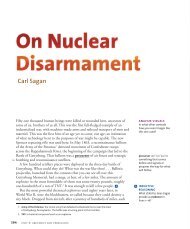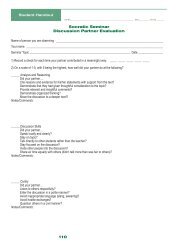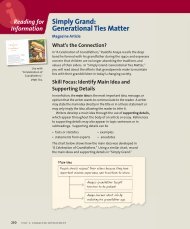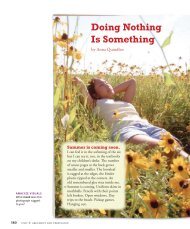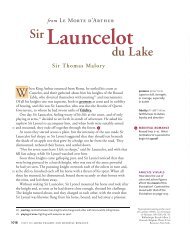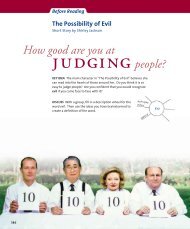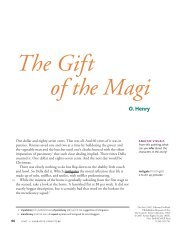The Language of Poetry - LanguageArts-NHS
The Language of Poetry - LanguageArts-NHS
The Language of Poetry - LanguageArts-NHS
You also want an ePaper? Increase the reach of your titles
YUMPU automatically turns print PDFs into web optimized ePapers that Google loves.
literary analysis: sound devices<br />
In the poems that follow, the poets use rhyme and other sound<br />
devices to convey rhythm and meaning:<br />
• Assonance—the repetition <strong>of</strong> vowel sounds in words that<br />
don’t rhyme<br />
We could find the end <strong>of</strong> a road, meet<br />
the sky on out Seventeenth. . . .<br />
• Consonance—the repetition <strong>of</strong> consonant sounds within and<br />
at the ends <strong>of</strong> words<br />
S<strong>of</strong>tly, in the dusk, a woman is singing to me;<br />
Taking me back down the vista <strong>of</strong> years, till I see<br />
• Repetition—a sound, word, phrase, or line that is repeated<br />
I loved her, and sometimes she loved me too.<br />
She loved me, sometimes I loved her too.<br />
Listen for the various sound devices that establish each poem’s<br />
rhythmic flow, and notice how they help to evoke specific<br />
memories. Record examples in a chart.<br />
“Piano”<br />
“Fifteen”<br />
“Tonight I Can<br />
Write . . .”<br />
reading skill: understand line breaks<br />
End-stopped lines <strong>of</strong> poetry end at a normal speech pause, as in<br />
these lines from “Tonight I Can Write . . .”:<br />
<strong>The</strong> same night whitening the same trees.<br />
We, <strong>of</strong> that time, are no longer the same.<br />
This emphasizes the line endings and makes a reader view each<br />
line as a complete unit <strong>of</strong> meaning.<br />
Enjambed lines run on without a natural pause, as in “Fifteen”:<br />
South <strong>of</strong> the bridge on Seventeenth<br />
I found back <strong>of</strong> the willows one summer<br />
day a motorcycle with engine running<br />
Enjambment can create a tension and momentum until the<br />
thought is complete. As you read each poem, think about how<br />
line breaks affect rhythm and meaning.<br />
Review: Make Inferences<br />
Assonance Consonance Repetition<br />
D. H. Lawrence: Writer<br />
<strong>of</strong> Experience<br />
Although impoverished<br />
during his childhood,<br />
D. H. Lawrence found<br />
great pleasure in<br />
learning and culture,<br />
a love <strong>of</strong> which<br />
was instilled by his<br />
mother. Lawrence’s<br />
confessional, earnest<br />
D. H. Lawrence<br />
1885–1930<br />
style is illustrated in<br />
the poem “Piano.” He<br />
wrote it in memory <strong>of</strong> his mother.<br />
William Stafford:<br />
Remembering the Past<br />
William Stafford<br />
remembered, growing<br />
up in Kansas, being<br />
“surrounded by songs<br />
and stories and poems,<br />
and lyrical splurges <strong>of</strong><br />
excited talk. . . .” <strong>The</strong>se<br />
memories eventually<br />
became the stuff <strong>of</strong><br />
his poetry. “Fifteen” is<br />
part <strong>of</strong> a collection <strong>of</strong><br />
poems that recall his past.<br />
Pablo Neruda: Boy<br />
Wonder Pablo Neruda<br />
was drawn to poetry<br />
at an early age, even<br />
though his workingclass<br />
family sc<strong>of</strong>fed at<br />
his literary ambitions.<br />
By age 20 he had<br />
achieved literary<br />
stardom with the<br />
publication <strong>of</strong> Twenty<br />
Love Poems and a Song<br />
<strong>of</strong> Despair. <strong>The</strong> book<br />
William Stafford<br />
1914–1993<br />
Pablo Neruda<br />
1904–1973<br />
chronicles a passionate love story, from the<br />
couple’s first meeting to eventual breakup.<br />
“Tonight I Can Write” is the 20th poem.<br />
more about the author<br />
For more on these poets, visit the<br />
Literature Center at ClassZone.com.<br />
721



